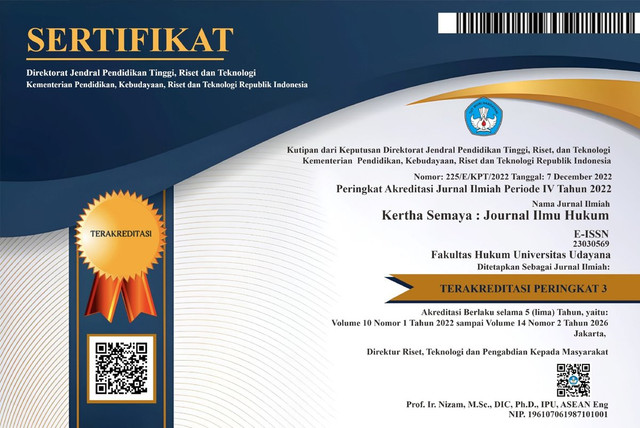PENGATURAN PENYADAPAN OLEH PENYIDIK KEPOLISIAN REPUBLIK INDONESIA BERDASARKAN PERSPEKTIF RANCANGAN UNDANG-UNDANG KUHAP
DOI:
https://doi.org/10.24843/KS.2025.v13.i10.p11Keywords:
Penyadapan, Penyidik Polri, Rancangan Perundangan, Kitab Undang-Undang Hukum Acara PidanaAbstract
Perkembangan teknologi informasi telah mendorong perubahan besar dalam praktik penegakan hukum, termasuk dalam penggunaan penyadapan sebagai alat bantu penyidikan. Penyadapan memiliki peran penting dalam mengungkap tindak pidana yang kompleks, namun di sisi lain berpotensi menimbulkan pelanggaran hak privasi apabila tidak diatur secara tegas. Penelitian ini bertujuan untuk mengkaji kewenangan penyadapan oleh penyidik Polri berdasarkan Rancangan Undang-Undang Kitab Undang-Undang Hukum Acara Pidana (RUU KUHAP), serta urgensi pembentukan regulasi khusus penyadapan sebagai bentuk pengawasan dan pembatasan wewenang penyidik. Metode penelitian yang digunakan adalah yuridis normatif dengan pendekatan perundang-undangan dan konseptual melalui analisis terhadap sumber hukum primer dan sekunder. Hasil penelitian menunjukkan bahwa RUU KUHAP memberikan dasar hukum baru bagi penyidik Polri dalam melakukan penyadapan sebagai upaya paksa yang sah, namun diperlukan regulasi khusus yang mengatur tata cara, batasan, dan mekanisme pengawasan penyadapan agar selaras dengan prinsip negara hukum dan perlindungan hak asasi manusia.
The advancement of information and communication technology has significantly transformed the landscape of law enforcement, particularly in the use of wiretapping as an auxiliary instrument in criminal investigations. Wiretapping serves a crucial function in unveiling complex and organized crimes; nevertheless, it simultaneously raises concerns regarding potential infringements of the right to privacy when not governed by clear and comprehensive regulations. This study examines the scope of authority vested in police investigators to conduct wiretapping under the Rancangan Undang-Undang Kitab Undang-Undang Hukum Acara Perdata (RUU KUHAP) and to examine the urgency of establishing a specific legal framework on wiretapping as a mechanism of supervision and limitation of investigative powers. Employing a normative juridical method with statutory and conceptual approaches, this research draws upon primary and secondary legal materials. The findings reveal that the RUU KUHAP provides a formal legal basis for police investigators to undertake wiretapping as a legitimate coercive measure within the criminal justice process. However, the study also emphasizes the necessity for a specific law that delineates the procedures, scope, and oversight mechanisms of wiretapping to ensure its conformity with the principles of the rule of law, due process, and the protection of fundamental human rights.
Downloads
Published
How to Cite
Issue
Section
License
Copyright (c) 2025 Rizki Samuel Nainggolan, Benny Sumardiana

This work is licensed under a Creative Commons Attribution-NonCommercial-ShareAlike 4.0 International License.



